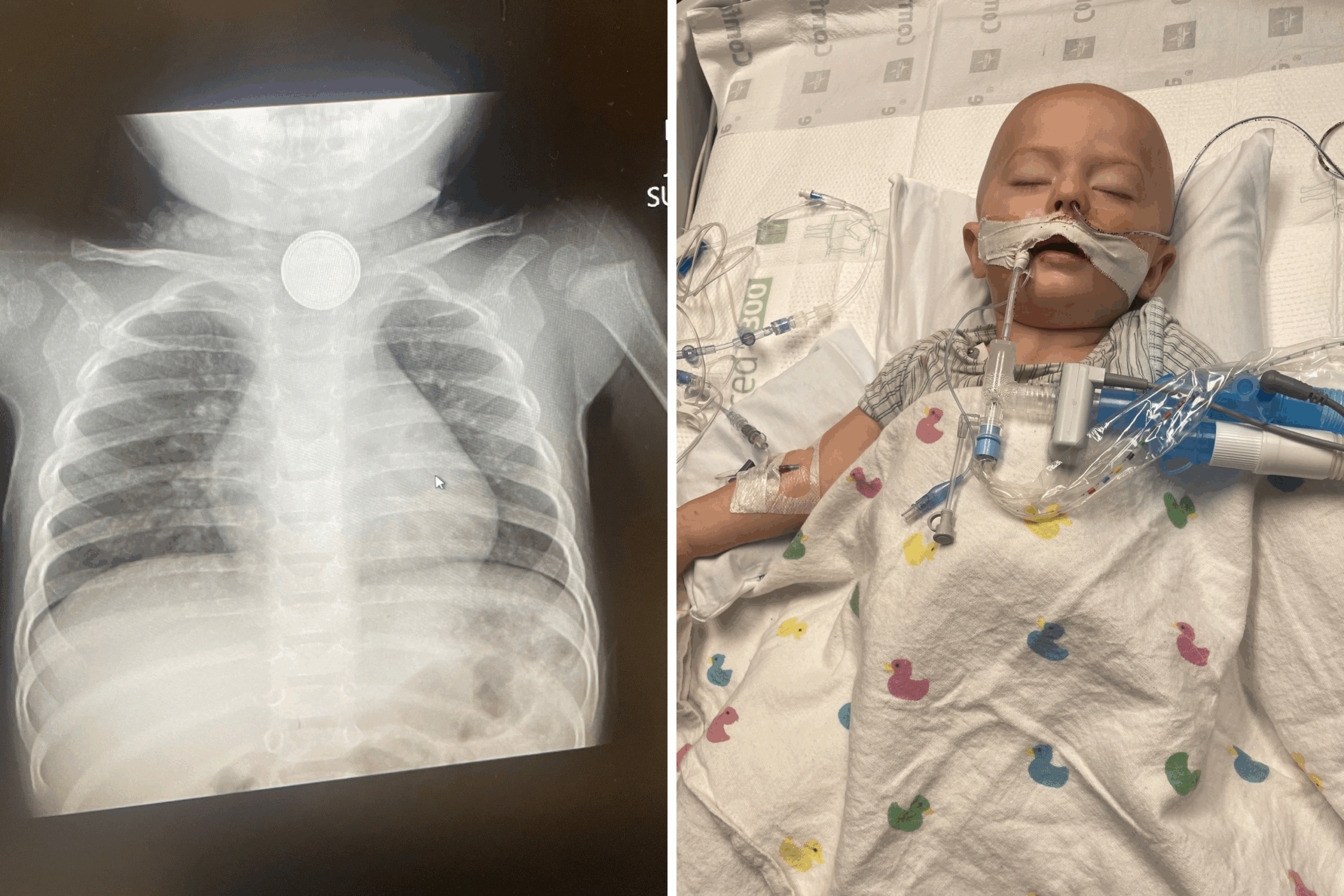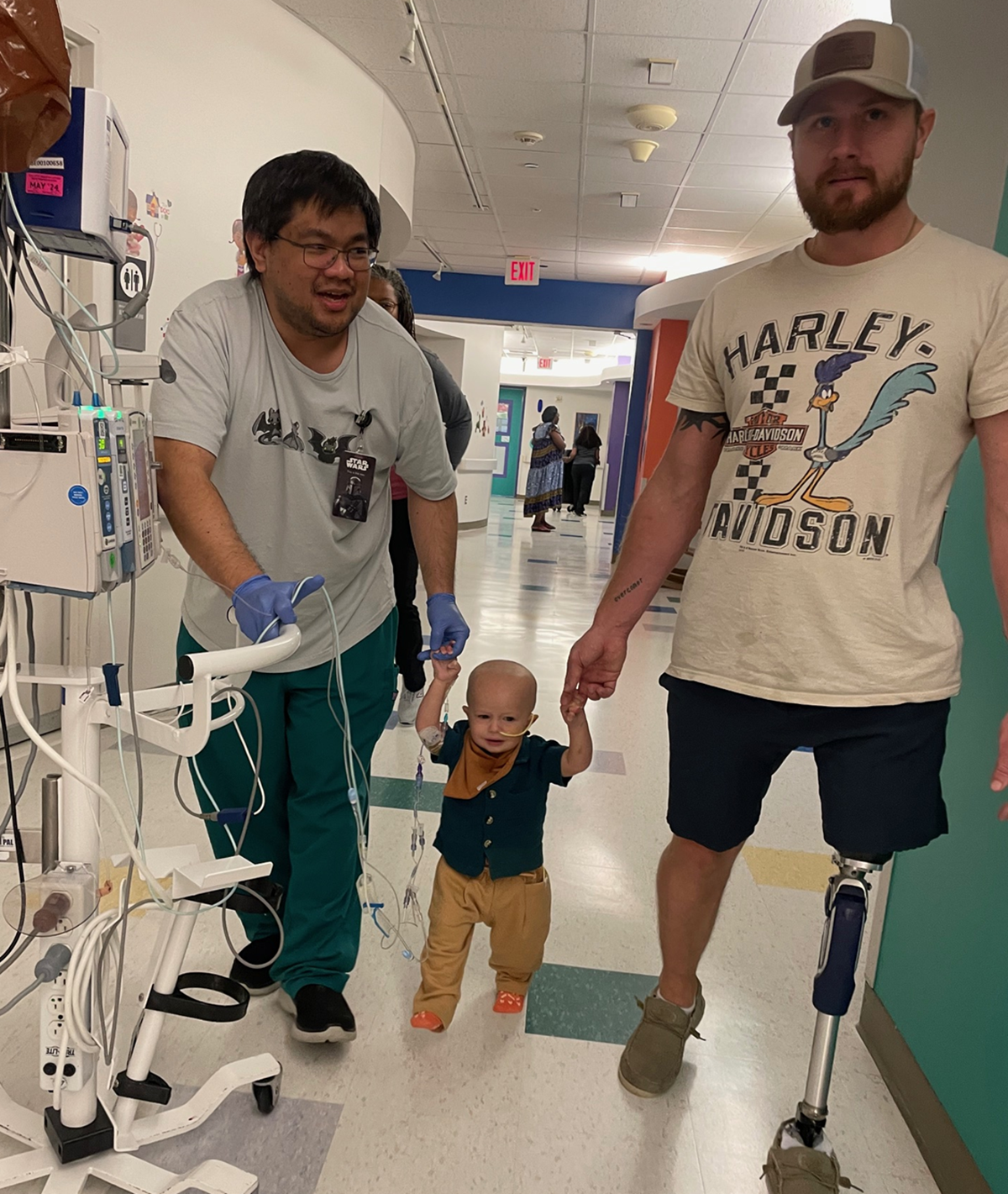
Asa was 16 months old when he nearly died after swallowing a button battery from a remote.
Now, ahead of his third birthday, his family reflects on a long and challenging recovery that has defined much of his young life.
Newsweek spoke to his mom, Kasey Allen, 32, who recently shared his story on TikTok for the first time.
She said: “My son almost died in a freak accident—it happened so fast. It’s crazy and I still believe it happened.”
TikTok/@kaseyall
In a phone interview, Allen, a photographer from Louisiana, explained how an ordinary day quickly spiraled into a weeklong nightmare.
On October 13, 2023, Allen and her kids, Sailor, then 5, Nayvie, 2, and Asa, were in their new RV, purchased two weeks before.
“The kids were playing, and I was doing some chores around 15 feet away. I found a broken remote on the floor, but I didn’t think anything of it,” Allen said.
“Asa was acting normal, so I don’t have a time frame of when he would have done it. But, about 20 to 30 minutes later, the symptoms started—he was fatigued, flushed, irritable, salivating, and coughing.
“He was acting tired and whiny. I thought he must be tired, so I laid him down for a nap,” the mom added.
“Looking back, I shouldn’t have done that, but I had no idea that a button battery was in the remote, nor did I know it was a dangerous battery.
“He is my third child, and we’ve never had to go to the emergency room (ER) with our kids before, so it was a first for us.”
After a 20-minute nap, his symptoms progressed, and black stuff started to come out of his mouth.
Allen said: “I started freaking out, so I called my friend who is a nurse, and she said it sounds like he has swallowed a button battery. Then the penny dropped.
“I loaded the kids up, and we rushed to the ER. They did an X-ray and saw the battery—it was caught in between the collarbones. They were not equipped to operate on him at all.”

Kasey Allen
The family was joined by Caleb and taken to a bigger hospital, where two other doctors attempted to remove the battery. After nine hours, a third surgeon managed to remove it, but it was touch and go.
“We were prepared for the worst and thought he wasn’t going to make it,” Allen told Newsweek. “It felt like I had been punched in the gut, but, in my mind, I wasn’t accepting that death was his fate. I felt like he had better plans. My body reacted to the news, but my heart wasn’t. We were in total shock that it was even happening.”
After the removal, they were taken to another hospital. Allen said: “When we got into a room, it was total chaos. There were about 20 medics rushing in, and that is when I began to wonder if my son was going to die.”
Asa stayed on a ventilator for six days, then things took a turn for the better.
“He continued to make progress and he LIVED through this!!” she wrote on TikTok in a caption of a viral video documenting his journey, racking up more than 3.4 million views (@kaseyall).
In total, they spent three weeks in hospital, where Asa had physical therapy up to three times a day, along with learning how to eat again.
But life didn’t go straight back to normal on their return home. Asa has been back and forth from the hospital from November 2023 to this day, undergoing a procedure that stretches his esophagus to make swallowing easier, called esophageal dilation.

Kasey Allen
Nicole Aaronson, a pediatric otolaryngologist at The Nemours Foundation in Jacksonville, Florida, told Newsweek what happens when the coin cell batteries are consumed.
She said: “Button batteries when lodged in the esophagus create an electrical current which forms hydroxide ions in the water of the patient’s tissues. These ions act as a strong base, which then cause a liquefactive necrosis of the tissue. This usually starts at the negative pole of the battery, but the longer the battery is in, the more circumferential the injury that can occur.
“Injury can propagate through the walls of the esophagus and into adjacent structures like the trachea or large blood vessels.”
Aaronson added that the injury can continue to worsen, even after the removal.
“Usually there is a follow up endoscopy to reassess the area of injury of significant damage is noted on the initial removal,” she said.
Today, Asa has had 28 procedures and another surgery to remove the scar tissue. Despite this, he is reaching his milestones and progressing well.
“We are finally on the better side of things. We’ve learned a lot and become a stronger family,” Allen said.
“It has been a journey of pain and terror, but I am thankful that we made it. Now I’m able to raise awareness of it.”
On May 5, Allen shared footage from their hospital stay, medical images of his esophagus, and photos of him in a state of delirium where he didn’t move, blink, or even sleep for three days.
Over 3,000 people have commented, asking questions and thanking her for sharing their story.
One user posted: “Because of people like you, I’ve started being more cautious about having button batteries in our house. You might be saving at least one life with your posts.”
“I’m so glad this baby is ok. You are so lucky,” added another.
Is there a health issue that’s worrying you? Let us know via health@newsweek.com. We can ask experts for advice, and your story could be featured on Newsweek.
